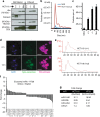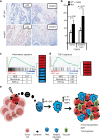Mutant p53 cancers reprogram macrophages to tumor supporting macrophages via exosomal miR-1246
- PMID: 29472616
- PMCID: PMC5823939
- DOI: 10.1038/s41467-018-03224-w
Mutant p53 cancers reprogram macrophages to tumor supporting macrophages via exosomal miR-1246
Abstract
TP53 mutants (mutp53) are involved in the pathogenesis of most human cancers. Specific mutp53 proteins gain oncogenic functions (GOFs) distinct from the tumor suppressor activity of the wild-type protein. Tumor-associated macrophages (TAMs), a hallmark of solid tumors, are typically correlated with poor prognosis. Here, we report a non-cell-autonomous mechanism, whereby human mutp53 cancer cells reprogram macrophages to a tumor supportive and anti-inflammatory state. The colon cancer cells harboring GOF mutp53 selectively shed miR-1246-enriched exosomes. Uptake of these exosomes by neighboring macrophages triggers their miR-1246-dependent reprogramming into a cancer-promoting state. Mutp53-reprogammed TAMs favor anti-inflammatory immunosuppression with increased activity of TGF-β. These findings, associated with poor survival in colon cancer patients, strongly support a microenvironmental GOF role for mutp53 in actively engaging the immune system to promote cancer progression and metastasis.
Conflict of interest statement
The authors declare no competing financial interests.
Figures







Similar articles
-
Exosomal microRNAs derived from colon cancer cells promote tumor progression by suppressing fibroblast TP53 expression.Cancer Sci. 2019 Aug;110(8):2396-2407. doi: 10.1111/cas.14084. Epub 2019 Jul 9. Cancer Sci. 2019. PMID: 31148360 Free PMC article.
-
Gain-of-function miRNA signature by mutant p53 associates with poor cancer outcome.Oncotarget. 2016 Mar 8;7(10):11056-66. doi: 10.18632/oncotarget.7090. Oncotarget. 2016. PMID: 26840456 Free PMC article.
-
BAG2 promotes tumorigenesis through enhancing mutant p53 protein levels and function.Elife. 2015 Aug 13;4:e08401. doi: 10.7554/eLife.08401. Elife. 2015. PMID: 26271008 Free PMC article.
-
Mutant p53 in Cancer: Accumulation, Gain-of-Function, and Therapy.J Mol Biol. 2017 Jun 2;429(11):1595-1606. doi: 10.1016/j.jmb.2017.03.030. Epub 2017 Apr 6. J Mol Biol. 2017. PMID: 28390900 Free PMC article. Review.
-
Gain-of-function mutant p53 in cancer progression and therapy.J Mol Cell Biol. 2020 Sep 1;12(9):674-687. doi: 10.1093/jmcb/mjaa040. J Mol Cell Biol. 2020. PMID: 32722796 Free PMC article. Review.
Cited by
-
Exosomal microRNAs in colorectal cancer: Overcoming barriers of the metastatic cascade (Review).Int J Mol Med. 2021 Jun;47(6):112. doi: 10.3892/ijmm.2021.4945. Epub 2021 Apr 28. Int J Mol Med. 2021. PMID: 33907829 Free PMC article. Review.
-
Mutant p53 in cancer: from molecular mechanism to therapeutic modulation.Cell Death Dis. 2022 Nov 18;13(11):974. doi: 10.1038/s41419-022-05408-1. Cell Death Dis. 2022. PMID: 36400749 Free PMC article. Review.
-
Exosome-mediated metabolic reprogramming: the emerging role in tumor microenvironment remodeling and its influence on cancer progression.Signal Transduct Target Ther. 2020 Oct 19;5(1):242. doi: 10.1038/s41392-020-00359-5. Signal Transduct Target Ther. 2020. PMID: 33077737 Free PMC article. Review.
-
Exercise-downregulated CD300E acted as a negative prognostic implication and tumor-promoted role in pan-cancer.Front Immunol. 2024 Jul 31;15:1437068. doi: 10.3389/fimmu.2024.1437068. eCollection 2024. Front Immunol. 2024. PMID: 39144140 Free PMC article.
-
Roles of exosomes in cancer chemotherapy resistance, progression, metastasis and immunity, and their clinical applications (Review).Int J Oncol. 2021 Jul;59(1):44. doi: 10.3892/ijo.2021.5224. Epub 2021 May 20. Int J Oncol. 2021. PMID: 34013358 Free PMC article. Review.
References
Publication types
MeSH terms
Substances
Grants and funding
LinkOut - more resources
Full Text Sources
Other Literature Sources
Molecular Biology Databases
Research Materials
Miscellaneous

